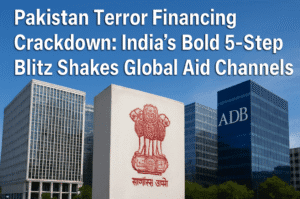Pakistan Terror Financing Crackdown: India’s Bold 5-Step Blitz Shakes Global Aid Channels
Following the April 22 terrorist attack in Pahalgam, Kashmir, which killed 26 tourists, India is escalating efforts to isolate Pakistan financially, citing terror financing concerns. A senior official confirmed plans to urge multilateral banks—including the IMF, World Bank, and ADB—to reassess development funding to Pakistan, arguing such aid risks diversion toward militant activities. Simultaneously, India seeks to reinstate Pakistan on the FATF’s “grey list” to intensify global scrutiny.
Pakistan’s fragile economy, heavily reliant on these institutions (with active World Bank projects worth $15.7 billion and a $7 billion IMF bailout), faces heightened instability if funding tightens. India’s strategy leverages counterterrorism norms to align international finance with security goals, though critics warn of unintended humanitarian consequences. Geopolitical tensions are further complicated by China’s support for Pakistan, setting the stage for a diplomatic clash in multilateral forums. The move tests how global financial institutions balance economic aid with security imperatives in a volatile region.

Pakistan Terror Financing Crackdown: India’s Bold 5-Step Blitz Shakes Global Aid Channels
In the wake of a devastating terrorist attack in Pahalgam, Kashmir, on April 22, 2025, which claimed the lives of 26 tourists, India is intensifying efforts to disrupt financial channels it alleges support terrorism in Pakistan. A senior government official revealed plans to engage multilateral development banks (MDBs), including the International Monetary Fund (IMF), World Bank, and Asian Development Bank (ADB), urging a reassessment of funding to Pakistan over terror financing concerns.
Strategic Moves Against Terror Financing
The attack, one of the deadliest in recent years, has prompted India to pursue a multi-pronged strategy. Beyond diplomatic condemnation, New Delhi aims to leverage its influence within global financial institutions to curb Pakistan’s access to critical funds. The official emphasized India’s intent to formally raise concerns during upcoming MDB board meetings, starting with the IMF’s review of Pakistan’s $7 billion bailout on May 9. Successive tranches of this loan hinge on Islamabad meeting stringent economic reforms, but India now presses for added scrutiny linking financial flows to counterterrorism compliance.
Simultaneously, India is rallying support to reinstate Pakistan on the Financial Action Task Force’s (FATF) “grey list,” which monitors jurisdictions deficient in combating money laundering and terror financing. Pakistan exited the list in 2023 after sustained reforms, but India argues that recent events warrant renewed oversight.
The Stakes for Pakistan
Pakistan’s economy, already fragile, relies heavily on multilateral aid. The World Bank’s active portfolio includes 54 projects worth $15.7 billion, while the ADB has committed $43.4 billion since 1966. Recent approvals, such as a $108 million package for Khyber Pakhtunkhwa, underscore Islamabad’s dependency. An IMF suspension or stricter loan conditions could exacerbate its balance-of-payments crisis, limiting its capacity to address inflation and debt.
India’s strategy capitalizes on global counterterrorism norms, urging MDBs to adopt a “security-first” lens in funding decisions. By highlighting alleged ties between Pakistan-based groups and cross-border terrorism, New Delhi seeks to align international financial policies with its security objectives.
Geopolitical Undercurrents
This financial offensive reflects deepening India-Pakistan tensions, compounded by historical disputes over Kashmir. While India frames its actions as necessary to safeguard regional stability, critics caution that economic isolation could hinder humanitarian projects in Pakistan, affecting vulnerable populations. Moreover, China’s role as a key ally to Pakistan adds complexity, with Beijing likely to counterbalance India’s push in multilateral forums.
Implications and Challenges
The outcome hinges on whether India can sway MDBs to integrate security concerns into economic assessments—a precedent that could reshape global development financing. However, convincing these institutions may require irrefutable evidence linking aid to militant activities, a challenge given the opaque nature of terror financing.
As India navigates this diplomatic tightrope, the broader implications for South Asia’s geopolitical landscape remain significant. Restricting Pakistan’s access to funds could strain its governance and security apparatus, potentially destabilizing the region further. Conversely, success in these efforts might bolster India’s stance as a proactive player in global counterterrorism, setting a benchmark for accountability in international finance.
In the coming weeks, all eyes will be on the IMF’s review and India’s diplomatic maneuvers, testing the interplay between economic aid and security imperatives in one of the world’s most volatile regions.
You must be logged in to post a comment.